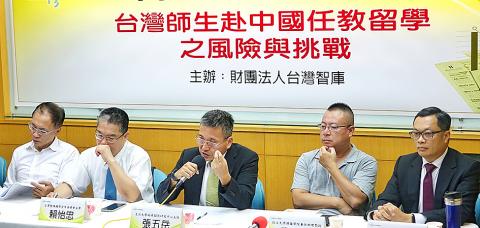Academics yesterday expressed concern about a growing number of Taiwanese studying in China, calling on the government and the public to beware of Chinese policies specifically favoring Taiwanese students.
The number of Taiwanese who have gone to China to study has risen for three consecutive years from 2,183 in 2015 to 2,567 last year, Mainland Affairs Council data showed.
While not a marked increase, the government and the public should beware of the growing trend at a time when schools nationwide are struggling to recruit students, as China’s courting of Taiwanese students is now happening not just at the university level, but also at the high-school level, Tamkang University Graduate Institute of China Studies associate professor Chang Wu-ueh (張五岳) told a news conference held by Taiwan Thinktank in Taipei.

Photo: Liu Hsin-de, Taipei Times
Some Chinese high schools that are considered prestigious have set aside slots for Taiwanese students, who are given priority, he said.
Many leading Chinese universities have introduced preferential admittance regimes for Taiwanese students, evidenced by students scoring an average of 45 in the government-administered General Scholastic Ability Test for university admittance — which uses a 75-point system — being admitted to three top Chinese schools last month, he added.
Students who aim to earn a medical degree in China, which is relatively easier than in Taiwan, should bear in mind that the Physicians Act (醫師法) would bar them from practicing in Taiwan, Chang said.
While studying in China might help people gain a better understanding of Chinese society and prevalent Chinese views on cross-strait relations, it does not seem to have any influence on their political beliefs or their identification with their home nation in the short term, he said, citing “at least 12 studies.”
Since Beijing in February introduced 31 measures to attract Taiwanese to work or study in China, several Chinese municipalities have followed up with their own versions, most of which involve providing cash through various channels, Taiwan Thinktank researcher Tung Li-wen (董立文) said.
Such policies are absurd and counterproductive to promoting cross-strait ties, as they put Taiwanese in a privileged class and discriminate against Chinese, he said.
Citing his observations as a former exchange student in China, National Taiwan University graduate student Lin Tzu-yao (林子堯) said that while allowing mediocre Taiwanese students admittance to prestigious Chinese institutions is tempting, the practice is divisive, as it causes hostility by Chinese students toward Taiwanese.
Some classmates who were interested in studying in China took the next flight home after seeing the poor conditions in the dorms at some universities, he said.
Academic freedoms, especially in social studies, are restricted at Chinese universities, where discussion of the Tiananmen Square Massacre remains taboo, he added.
Students who want to use Chinese diplomas as a springboard to higher-ranked US institutions are likely to achieve the opposite effect, as US President Donald Trump’s administration has taken a stricter approach when screening Chinese students out of concern for possible theft of US technologies, Lin said.

MAKING WAVES: China’s maritime militia could become a nontraditional threat in war, clogging up shipping lanes to prevent US or Japanese intervention, a report said About 1,900 Chinese ships flying flags of convenience and fishing vessels that participated in China’s military exercises around Taiwan last month and in January last year have been listed for monitoring, Coast Guard Administration (CGA) Deputy Director-General Hsieh Ching-chin (謝慶欽) said yesterday. Following amendments to the Commercial Port Act (商港法) and the Law of Ships (船舶法) last month, the CGA can designate possible berthing areas or deny ports of call for vessels suspected of loitering around areas where undersea cables can be accessed, Oceans Affairs Council Minister Kuan Bi-ling (管碧玲) said. The list of suspected ships, originally 300, had risen to about

DAREDEVIL: Honnold said it had always been a dream of his to climb Taipei 101, while a Netflix producer said the skyscraper was ‘a real icon of this country’ US climber Alex Honnold yesterday took on Taiwan’s tallest building, becoming the first person to scale Taipei 101 without a rope, harness or safety net. Hundreds of spectators gathered at the base of the 101-story skyscraper to watch Honnold, 40, embark on his daredevil feat, which was also broadcast live on Netflix. Dressed in a red T-shirt and yellow custom-made climbing shoes, Honnold swiftly moved up the southeast face of the glass and steel building. At one point, he stepped onto a platform midway up to wave down at fans and onlookers who were taking photos. People watching from inside

Japan’s strategic alliance with the US would collapse if Tokyo were to turn away from a conflict in Taiwan, Japanese Prime Minister Sanae Takaichi said yesterday, but distanced herself from previous comments that suggested a possible military response in such an event. Takaichi expressed her latest views on a nationally broadcast TV program late on Monday, where an opposition party leader criticized her for igniting tensions with China with the earlier remarks. Ties between Japan and China have sunk to the worst level in years after Takaichi said in November that a hypothetical Chinese attack on Taiwan could bring about a Japanese

STREAMLINED: The dedicated funding would allow the US to transfer equipment to Taiwan when needed and order upgraded replacements for stockpiles, a source said The US House of Representatives on Thursday passed a defense appropriations bill totaling US$838.7 billion, of which US$1 billion is to be allocated to reinforcing security cooperation with Taiwan and US$150 million to replace defense articles provided to the nation. These are part of the Consolidated Appropriation Act, which the US House yesterday passed with 341 votes in favor and 88 against. The act must be passed by the US Senate before Friday next week to avoid another government shutdown. The US House Committee on Appropriations on Monday unveiled the act, saying that it allocates US$1 billion for the Taiwan Security Cooperation Initiative